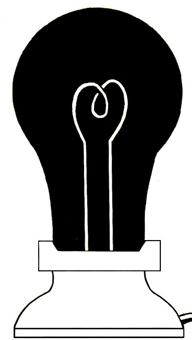Originally published July 25, 2013:
This third post in a series is about the illusion of visual interpretation. The illustrations for this post are examples I have collected that may be familiar to you but will also remind you of the tricks our brains play on us when it comes to what we see – or don’t see. We often play games with optical illusions to see if the eye is tricked into following the focal point, of if we can focus on the reality that is hidden. These exercises illustrate two concepts I’d like to address in this article.
As I have mentioned elsewhere in my writings, our brains do an incredible job of interpreting the world around us by using our five senses. Everything we know, after all, starts with seeing, hearing, tasting, feeling and smelling. Although that input seems seamless to us it really isn’t. In order to save “storage space” and to process things quickly, our brains pick up pieces of what we see and convert that to a whole picture. And, while it seems instantaneous it actually does take a measurable amount of time between sensory input and mental interpretation. It also creates a “story” to inform you about what that thing you see/hear/feel/taste/smell means and what you should do about it. There is only one problem with this marvelous creation – our brains lie. Yes really.
The illustrations I have included here are simple. In the first graphic, your eye tends to believe that the parallel lines are bent. They are not. The radiating lines trick your brain into seeing something that is not there.
The second illustration is that of a light bulb. Look at the drawing for the count of 15-20 then look away. I wouldn’t recommend much longer because the image will last a little longer than comfortable. You will find that your eyes see a “negative” of the graphic and that the image is somewhat burned into your vision. When your mind is no longer tracking time correctly, or correctly interpreting the visual information you receive, images from your memory can interfere with the real world around you. Again, this interpretation of reality is every bit as real in the mind of a person with dementia as things that you see are to you.
This group of photographs is a collection of owls perched in various natural habitats where they can be completely camouflaged. How easy is it for you to locate each owl? How easy would it be if you could not picture what it was you were looking for and accurately compare that image with what is in front of you? The brain can only interpret the input provided based on what it is able to draw from memory. If that memory is corrupted or no longer functioning at all, the world becomes less and less meaningful.
It is for these reasons that I have learned to do more showing rather than telling in our home. The point here is to keep aggravation and emotional triggers at a minimum. For instance, I make sure that when we are at the grocery store I show him each lunch I am purchasing for him in hopes that he will eat it. He will read about the contents and look at the pictures. For instance, he knows he doesn’t like a lot of fancy looking vegetables. I am also not always certain that he knows what is in the box. He does, however, know that I have asked him to help me pick things out and he is more likely to eat something because of that. Showing, reinforcing and repetition (without increasing volume) will go a long way to reducing confusion.
The important thing to understand is that when a person loses the ability to comprehend abstracts, that person’s interpretation of the world becomes filtered through an entirely different thought process than what we use every day. If you cannot understand abstracts how can you understand that what you see may not be what is really there? Can you comprehend that something is a shadow or a reflection? Once you “see” something in a certain order, how easy is it adjust your view? Even when you have reasonable cognitive control? After all, you do see it don’t you?
This is something that I have understood in some ways for quite some time. I think, though, I didn’t internalize it and see it for the problem it causes the person suffering from dementia. Take for example a case where he believes that there are people sitting in our car which is parked in our car port. Is it a reflection his eye is not interpreting correctly? Is it a timing sequence thing and he actually sees us sitting in the car as we might look on occasion? Is it a memory in his mind that has floated free of its roots and attached itself to the most convenient interpretation?
Whatever the cause, what the person afflicted with dementia “sees” is every bit as real in their brain as what you see and firmly believe to be reality. Belittling or dismissing the event will accomplish nothing. If it means that one or both of you must go check the car, check the basement, open doors or turn lights on or off, then that is what you must do. The more confidence you build in the individual that you take them seriously; the more responsive they will be to you when you try to explain that you have handled the situation. I constantly remind my husband that I am the only lady that lives in our home. Although he will insist that is not true, he seems far more comfortable with that solution than having me tell him I don’t know who these people are, where they have gone or if they might come back. Look for the solution with the lowest aggravation and emotional impact. Sometimes it takes a day or two, sometimes it comes back. I know that it is a constant effort for me to explain that I am “that woman” wherever and whoever I am throughout the day.
Humor and the art of not “managing” by not managing.
One of the things I am often asked is “how do you manage.” My short answer? I don’t. “Manage” in this context sounds like something you drag yourself through, hour by hour. Or, perhaps something that requires a huge amount of effort and exhausts every part of your being. It is hard? Do I get frustrated? Do I cry? Yes, oh, most definitely yes. Do I miss him, the man I married? Oh, yes, with all my heart and soul. But, I am no good to him or myself if I don’t start from where we are, acknowledge the limitations and find ways to move forward. I don’t “manage.” I find ways to enjoy where we are now. If you are dealing with a patient, look for pieces of remaining personality. If it is a loved one, cherish the little odd things of the day that give you something to smile about. Above all, do not blame the person or yourself. That individual is not sitting around thinking up ways to irritate you or to fill your days with endless requests, minor upsets, and changes in mood or attitude. They live in a world that is no longer anchored in reality.
Once you are able to truly separate what was from what is you are far better equipped to see the lighter side wherever it can be found. You are also better prepared to automatically seek the less emotional option in any situation.
You also find yourself more sensitive to changing moods and when it might be time to quietly step away for awhile. Asking a person with dementia what is wrong is a futile exercise. They do not know and you only confuse the issue by pressing. Always seek the simplest answer and provide only the amount of information required for the task at hand. You are not going to win a logical argument; logic no longer plays a part in the function of a brain affected by dementia. Deflect, reassure, support. It will be a lot easier on both of you.
I’ll close with this little tale. One night I was sitting at my computer trying to finish something or other I thought important and I heard him digging around in our bedroom. Doors and drawers were opening and closing – I just couldn’t figure out what was going on. In those cases it is usually best to check on things. When I opened the door to the bedroom he was standing there with one of our decorative cushions in his hand. I asked him if he needed something. Yes, I can’t find any pillows. But, dear, there are pillows on the bed. Well, yes, but that other woman uses them and I want you to have pillows. He had actually made a space in the middle of the bed, next to him, where he could add a pillow – for me. I started to giggle. I told him I didn’t think it would be a problem, I was sure I could use those pillows. No, he was certain, there had to be more. So, (giggling) I showed him where we kept the extra pillows and assured him that when I got ready for bed if the pillows were taken I knew where to get more. This seemed to satisfy him for the moment. Somehow I got terribly tickled by the notion that he wanted all of his ladies to have pillows. I giggled so hard I got tears in my eyes.
Humor. It doesn’t mean you are laughing at your loved one or a patient. It means that you look at life with a sense of the practical joke it can sometimes be. It is what changes things from “managing” to living through a different phase of your life in the best way possible.
This series is now being presented as a talk to several organizations in the Seattle metro area. If you would like someone to speak to your organization, then by all means leave a comment.






No Comments